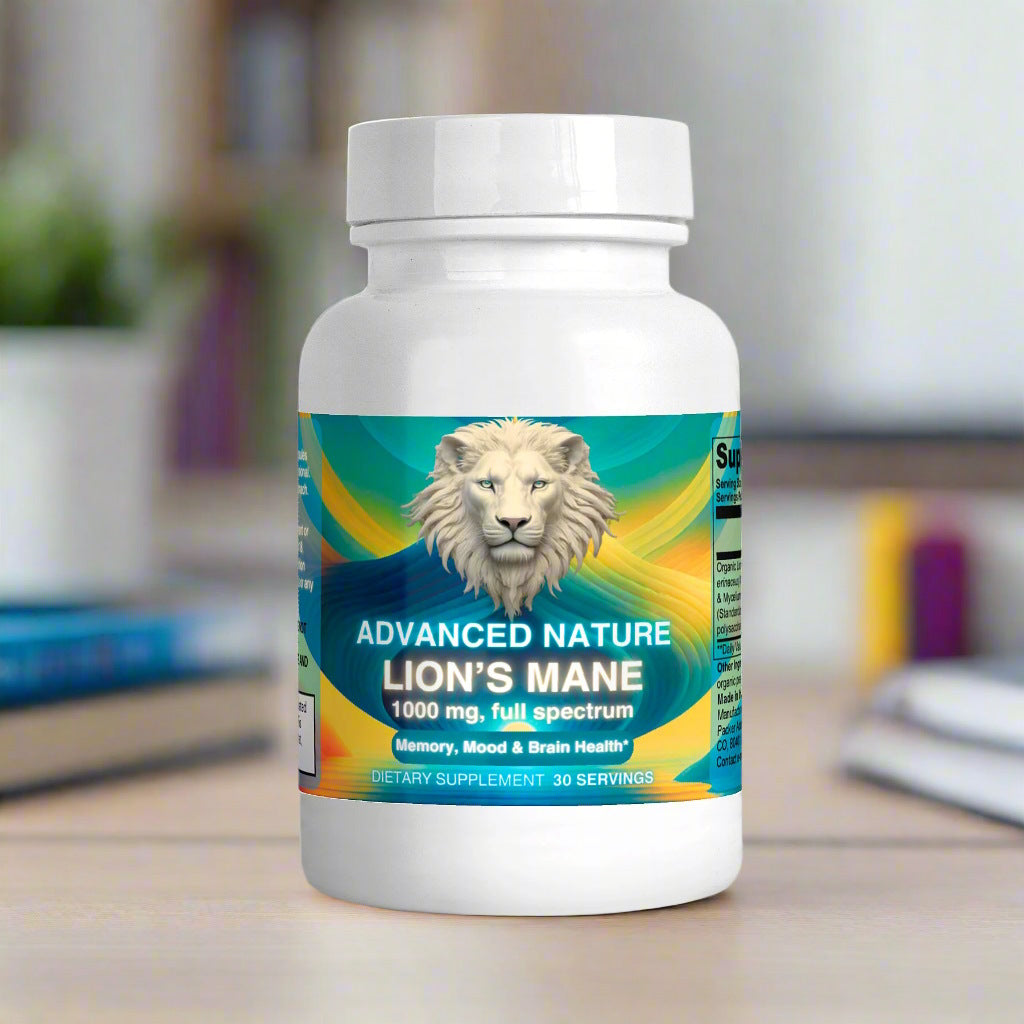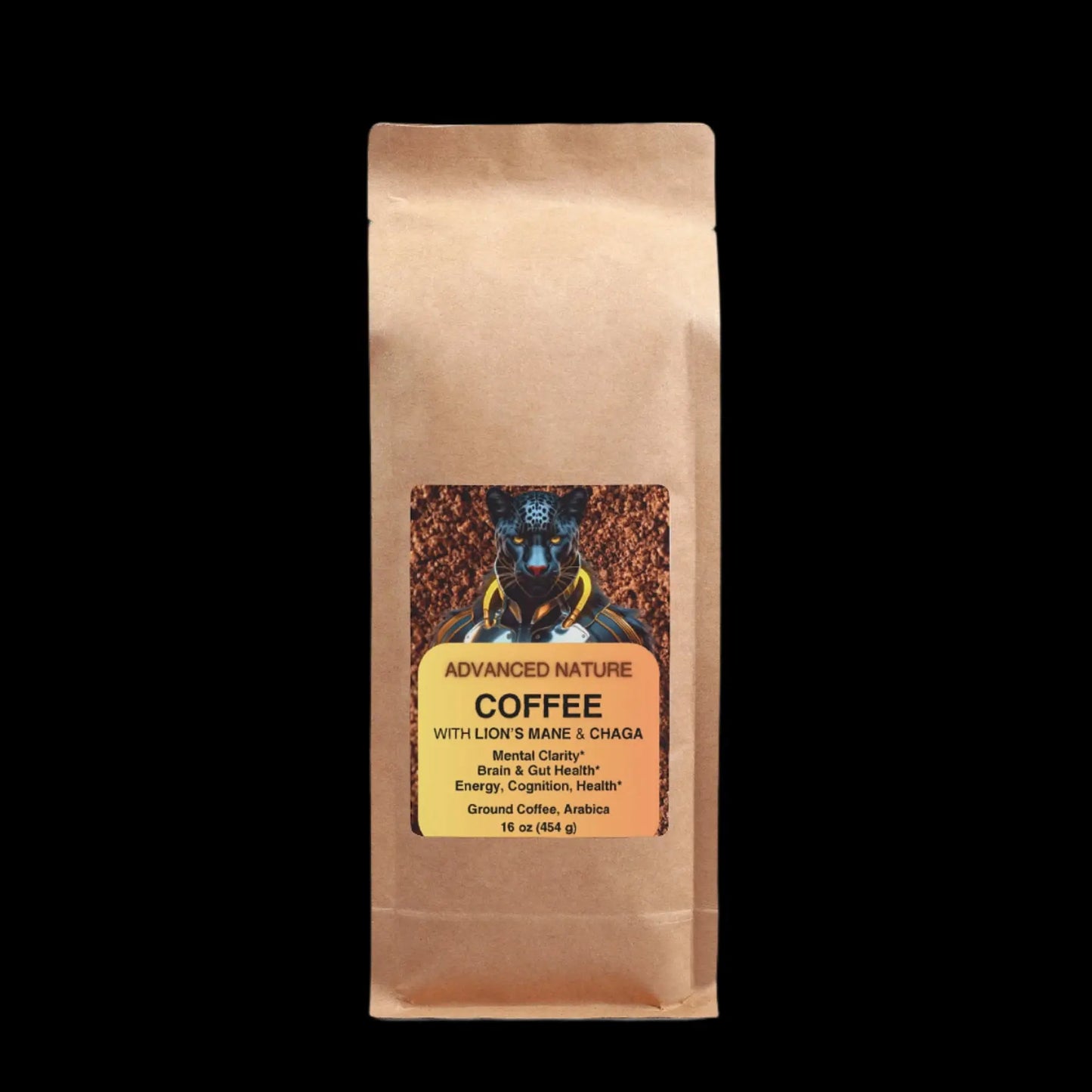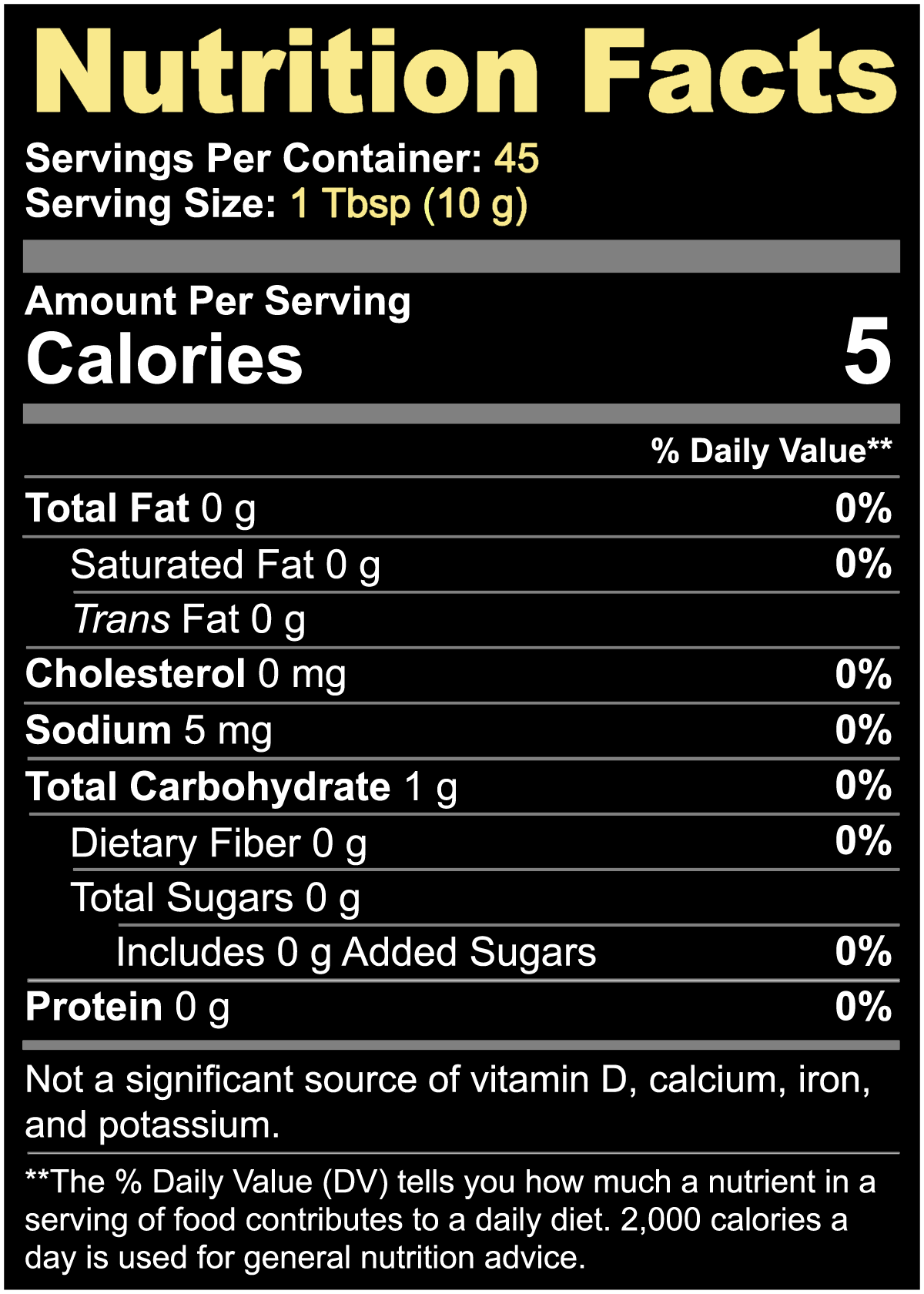
Evidence-Based Benefits of Lion's Mane Mushroom
Share
Lion’s Mane mushroom (Hericium erinaceus) has captured the attention of scientists and wellness enthusiasts alike — and for good reason.
Backed by a growing body of human and animal research, this powerful nootropic and adaptogen offers a wide range of potential benefits, from sharper focus and improved mood to gut health, immune balance, and even anti-aging effects.
In this article, we explore the most compelling evidence behind Lion’s Mane’s effects on the brain, body, and beyond.
Overview
Lion's Mane is safe [1, 2, 3] and may lead to the following benefits*:
- 🧠 Brain Health & Cognitive Enhancement **
- 🌞 Better Mood **
- 🍏 Gut & Gut Microbiome Health
- 🍀 Antioxidant & Anti-inflammatory
- 🛡️ Immune Health
- ⚡ Physical Endurance
- 🍸 Reduce alcohol damage
- 🧬 Rejuvenation & Longevity
** Clinically proven in human trials.
🛒 In our store, we have amazing Arabica Coffee with Lion's Mane & Chaga and Lion's Mane Full Spectrum 1000 mg capsules!
*These statements have not been evaluated by regulatory food and healthcare agencies in all jurisdictions.

🔬Bioactive Compounds
Lion's Mane contains bioactive compounds like erinacines, hericenones, polysaccharides, and ergothioneine. [4, 5]
Erinacines are present in Lion's Mane's mycelium, Hericenones are present in its fruiting body. Polysaccharides and ergothioneine are present in both. [5, 6]
- Erinacines and hericenones can stimulate nerve growth factor (NGF) and brain-derived neurotrophic factor (BDNF) synthesis, which is crucial for neuroplasticity and memory, and overall brain health. [7, 8, 9] They also improve neurite outgrowth (new connection formation) through other mechanisms [5], and enhance neurogenesis (new brain cells formation) in the hippocampus. [10, 11]
- Erinacines are present in Lion's Mane's mycelium (150 µg/g of Erinacine A)
- Hericenones are present in Lion's Mane's fruiting body (500 µg/g of Hericenone C; <20 µg/g of Hericenone D) [5, 6]
- Polysaccharides have shown immunomodulatory and antioxidant activities. [5, 12, 13]
- Ergothioneine is a potent antioxidant that can reduce oxidative damage. [14, 15, 16] It is present in both the mycelium (580 µg/g) and the fruiting body (340 µg/g) of the mushroom. [5, 6]

A summary of active substances of Lion's Mane and their biological activities (adapted from Qiu Y. et al., 2024)
🧠 Brain Health & Cognitive Enhancement
Lion's Mane mushroom (Hericium erinaceus) is well known for its brain health benefits, including neuroprotection, enhanced cognitive function, and neuroplasticity.
Its bioactive compounds stimulate nerve growth, protect against oxidative stress, and exhibit anti-inflammatory properties, contributing to improved brain health.

Preclinical Studies
The neuroprotective mechanisms involve NGF and BDNF synthesis stimulation, antioxidant effects, and anti-inflammatory activities. [2, 3, 17-21]
- In mouse models, Lion's Mane extracts improved memory, reduced amyloid plaques, and lowered inflammation in Alzheimer's disease models. [17, 18]
- Lion's Mane treatment increased neurogenesis (new brain cells production) markers like doublecortin in the hippocampus of aged mice. [2, 10, 11]
- In vitro (in cell cultures), Lion's Mane stimulated neurite outgrowth (which is crucial for neuroplasticity and memory), and protected neuron cells from toxicity. [19, 20]
- Also, the 2025 in vitro study has concluded: "...Hence, our findings emphasize the therapeutic promise of myo-inositol compounds of the H. erinaceus [Lion's Mane] aqueous extract in ADHD conditions." [51]
Clinical Studies
- In a study on 30 people with mild cognitive impairment, Lion's Mane improved cognitive scores compared to placebo. [21]
- A study on people over 50 has found that Lion's Mane prevented short-term memory decline and improved cognition. [22]
- In people with mild Alzheimer's disease, supplementation with Lion's Mane mycelium's molecule erinacine A improved cognitive function and daily living scores. [23]
🌞 Better Mood
- 2 small clinical studies have found reduced depression and anxiety symptoms by 4 weeks of Lion's Mane intake. [24, 25]
- 1 more non-randomized clinical study of 77 people has also found that: "H. erinaceus (Lion's Mane) promoted an improvement in mood disorders of a depressive-anxious nature and of the quality of nocturnal rest. These effects persisted after eight weeks of H. erinaceus wash-out, suggesting that H. erinaceus might affect neuronal plasticity as expected by a NGF or BDNF like effect." [26]
🍏 Gut and Gut Microbiota Health
Studies on animals indicate that Lion's Mane extract exhibits gastroprotective, immunomodulatory, anti-inflammatory, and prebiotic effects, promoting beneficial gut bacteria while alleviating gastrointestinal diseases.
- A 2013 study on rats has shown a significant gastroprotective and regenerative activity of Lion's Mane extract in gastric ulcer models. [27]
- A 2017 study on mice and cell cultures has shown that Lion's Mane's proteins provide immunomodulatory and anti-inflammatory effects through regulating the gut microbiota. [28]
- The same year study on rats has shown that Lion's Mane extracts relieve inflammatory bowel disease by regulating immunity and gut microbiota. [29]
- A 2023 review summarized more than 10 studies of the efficiency of different Lion's Mane's compounds against numerous gastrointestinal diseases and has concluded that the results are promising. [30]
- Finally, a 2024 study on mice, published in Biology, has concluded that Lion's Mane "promotes the growth of beneficial gut bacteria, parallelly reducing pathogen bacteria, therefore revealing its prebiotic effect. Additionally, this oral supplementation had a positive impact on cognitive function, also leading to a decrease in inflammation in the hippocampus, a brain area crucially involved in memory formation and consolidation. Overall, these findings support the notion that changing the gut microbiome composition through nutrition modulation could trigger longevity-promoting effects, protecting from age-related cognitive decline." [6]

Lion's Mane's Beneficial Effects on Gut–Neuroinflammaging–Cognitive Axis (adapted from Priori, E. C. et al., 2024)
🍀 Antioxidant & Anti-inflammatory
Antioxidant
4 studies on animals [31, 32, 33, 34] have shown that Lion's Mane has significant antioxidant activities, which can contribute to its anti-fatigue and anti-aging activities. [35]
Anti-inflammatory
Numerous animal studies have shown that anti-inflammatory action is one of the main mechanisms of Lion's Mane benefits — from reducing neuro-inflammation in preventing Alzheimer's disease [18, 36], to improving gut and overall health by reducing inflammation and modulating healthy gut microbiota, which produces anti-inflammatory molecules. [6, 28, 29]
🛡️ Immune Health
A large number of in vitro (on cell cultures) [37, 38, 39, 40, 41] and in vivo (on animals) [28, 42, 43, 44, 45] experiments have confirmed Lion's Mane's immunomodulatory activity:
- Lion's Mane polysaccharides improve immune function by functionally enhancing cell-mediated and humoral immunity, macrophage phagocytosis, and NK cell activity. [43]
- A hetero polysaccharide fraction (HEP-W) from Lion's Mane possessed protective effects against cyclophosphamide-induced immunosuppression in mice by significantly enhancing immune organ index, splenocyte proliferation, NK cell activity, IL-2 production as well as improving the macrophage phagocytosis. These findings suggest that HEP-W could be explored as a natural and effective immunomodulatory agent. [44]
- Lion's Mane polysaccharides could regulate composition of gut microbiota... [and] could regulate the immune function via NF-кB, MAPK and PI3K/Akt signaling pathways. [45]
⚡ Physical Endurance
One quality study on mice has shown that after 28 days of Lion's Mane treatment, "Exhaustive swimming times in the [3 different dosage Lion's Mane] groups were significantly longer than that in the Control group, by 18%, 37% and 58%, respectively. These results indicated that Lion's Mane had significant anti-fatigue activity and was capable of elevating the exercise tolerance in mice." [33]
🧬 Rejuvenation & Longevity
Although by 2024, there were no clinical studies on Lion's Mane efficiency in human rejuvenation and longevity, some animal studies have shown promising results:
- ...Supplementation with erinacine A-enriched H.erinaceus mycelia extended the lifespan in both Drosophila melanogaster and senescence-accelerated mice by a maximum of 32% and 23%, respectively, compared to the untreated controls...these findings suggest that erinacine A-enriched H.erinaceus mycelia supplement could promote longevity, mediated partly through the induction of endogenous antioxidants enzymes. [46]
- ...Lion's Mane polysaccharides significantly enhanced skin antioxidant enzymes, MMP-1, TIMP-1 activities and collagen protein levels in a dose-dependent manner. It can be concluded that H. erinaceum (Lion's Mane) polysaccharides possess anti-skin-aging activities. [47]
- Also, Lion's Mane extracts significantly reduced locomotor frailty index and cognitive frailty index in old mice [48]
- Ergothioneine (EGT) (a bioactive compound of Lion's Mane) acts as a master food ingredient in promoting longevity via combating oxidative stress, modulation gene expression, and signal transduction cascades related to aging. EGT, with the ability to scavenge free radicals, promote upregulation of antioxidants via the Nrf2 pathway, and chelate metal ions, has an essential role in preventing the progression of the ageing process. [16]
- It has also been shown that Lion's Mane supplementation could restrain the hepatic damage caused by acute alcohol exposure. [49]
Conclusion
From enhanced neuroplasticity and mood balance to gut health and longevity, Lion’s Mane mushroom is much more than just a culinary curiosity — it’s a bioactive powerhouse!
Whether you're seeking mental clarity, immune resilience, or healthy aging support, Lion’s Mane could be a smart, natural ally in your routine.
⚡🧠💪


![Advanced Nature Lion's Mane capsules. Supplement Facts label showing the following information:
Serving Size: 2 Vegan Capsules. Servings Per Container: 30.
Amount Per Serving:
Organic Lion’s Mane (Hericium erinaceus) Mushroom Fruiting Body & Mycelium Powder: 1000 mg (Daily Value not established).
(Standardized to 40% polysaccharides [400mg])
Other Ingredients: Organic capsule (pullulan, water), organic pea starch.](http://biohq.store/cdn/shop/files/biohq-advanced-nature-lions-mane-mushroom-500-mg-full-spectrum-supplement-facts.png?v=1769363546&width=1445)

























